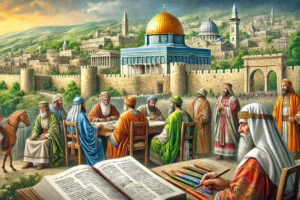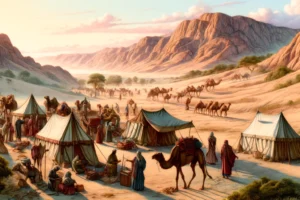
Edom: A Biblical Tale of Conflict and Judgment
Edom, a historical region located south of the Dead Sea in present-day Jordan, holds significant relevance in the Bible. Named after Esau, the brother of Jacob, Edom’s inhabitants, known as Edomites, are frequently mentioned in various biblical narratives, often in the context of conflicts and interactions with Israel and Judah.
Quick Facts:
- Location: Edom was a region south of the Dead Sea, in present-day Jordan.
- Founding Ancestor: Edom was named after Esau, the brother of Jacob, also known as Edom.
- Edomites: The inhabitants were called Edomites, descendants of Esau.
- Biblical Conflict: Edom had frequent conflicts with Israel and Judah.
- Capital City: The capital city of Edom was Bozrah, mentioned in Isaiah and Amos.
- Trade and Economy: Edom was strategically located on the King’s Highway, a major trade route.
- Prophetic Judgment: Edom is the subject of several prophetic judgments in books like Obadiah, Isaiah, and Jeremiah.
- Relations with Israel: Despite being related to Israel, Edom often opposed and fought against the Israelites.
- Mount Seir: Edom was also known for the mountainous region of Mount Seir.
- Historical Downfall: Edom eventually fell to the Babylonians and later the Nabateans.
Edom’s significance in the Bible is rooted in its relationship with Israel, its geographical and economic importance, and the prophetic judgments pronounced against it. Esau, the founding ancestor of Edom, was the twin brother of Jacob, later named Israel. This familial link, described in Genesis 25:19-34, 27:1-45, and 36:1-43, set the stage for a turbulent relationship between the descendants of these two brothers.
Geographic and Economic Importance
Edom was strategically located south of the Dead Sea, extending from the Zered River in the north to the Gulf of Aqaba in the south. This region included significant landmarks such as Mount Seir and the King’s Highway, an ancient trade route that connected Africa to the rest of Asia. The Edomites exploited their strategic location to control trade routes, levying tolls on caravans passing through their territory, which significantly contributed to their wealth.
Conflicts with Israel
The relationship between Edom and Israel was marked by persistent conflict. Numbers 20:14-21 recounts the refusal of Edom to allow the Israelites passage through their land during the Exodus. This hostility continued into the period of the kings. King Saul fought against the Edomites (1 Samuel 14:47), and David conquered Edom, establishing garrisons there (2 Samuel 8:13-14). Later, Edom regained independence during the reign of King Jehoram of Judah (2 Kings 8:20-22). These conflicts highlight the ongoing tension and warfare between the two nations.
Prophetic Judgments
Edom is the subject of several prophetic judgments due to its persistent hostility towards Israel. The book of Obadiah is entirely dedicated to the judgment of Edom, condemning their pride and violence against their brother nation, Israel. Obadiah 1:3-4 states, “The pride of your heart has deceived you… though you soar like the eagle and make your nest among the stars, from there I will bring you down,” declares the Lord.
Isaiah 34:5-15 and Jeremiah 49:7-22 also pronounce severe judgment against Edom, predicting desolation and divine retribution for their actions. These prophecies underscore the moral and spiritual dimensions of Edom’s fate, presenting their downfall as a consequence of their arrogance and cruelty.
Capital City and Cultural Heritage
The capital city of Edom was Bozrah, mentioned in Isaiah 63:1 and Amos 1:12. Bozrah was a significant urban center in Edom and often symbolized the nation in biblical texts. Additionally, Petra, known as Sela in the Bible (2 Kings 14:7), was another important city, famed for its rock-cut architecture and strategic location.
Historical Downfall
Edom’s downfall began with its conquest by Babylon under Nebuchadnezzar II in the 6th century BC. Later, the Nabateans, an Arab tribe, displaced the Edomites from their territory, forcing them to migrate westward into southern Judah. This migration led to their eventual integration with the local population and the loss of a distinct Edomite identity.
Theological Insights
Edom’s narrative in the Bible offers profound theological insights, particularly regarding the themes of brotherhood, pride, and divine justice. The enmity between Esau and Jacob, and subsequently between their descendants, serves as a cautionary tale about the long-lasting effects of familial strife. Moreover, the prophetic condemnations of Edom highlight the biblical principle that pride and violence against one’s kin are abhorrent to God and will ultimately lead to downfall and judgment.
In conclusion, Edom’s story is interwoven with the history of Israel, serving as a testament to the complexities of their relationship and the broader themes of divine justice and human hubris. Its strategic location, economic significance, and eventual demise are all integral to understanding its place in biblical history.



